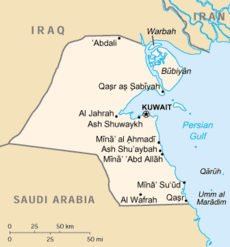| UN Security Council Resolution 661 | ||
|---|---|---|
 Kuwait | ||
| Date | 6 August 1990 | |
| Meeting no. | 2,933 | |
| Code | S/RES/661 (Document) | |
| Subject | Iraq–Kuwait | |
Voting summary |
| |
| Result | Adopted | |
| Security Council composition | ||
Permanent members | ||
Non-permanent members | ||
| ||
In United Nations Security Council resolution 661, adopted on 6 August 1990, reaffirming Resolution 660 (1990) and noting Iraq's refusal to comply with it and Kuwait's right of self-defence, the Council took steps to implement international sanctions on Iraq under Chapter VII of the United Nations Charter. This was the second resolution by the Security Council over the invasion of Kuwait.
The Council therefore decided that states should prevent:
- (a) the import of all products and commodities originating in Iraq or Kuwait;
- (b) any activities by their nationals or in their territories that would promote the export of products originating in Iraq or Kuwait, as well as the transfer of funds to either country for the purposes of such activities;
- (c) the sale of weapons or other military equipment to Iraq and Kuwait, excluding humanitarian aid;
- (d) the availability of funds or other financial or economic resources to either country, or to any commercial, industrial or public utility operating within them, except for medical or humanitarian purposes.
Resolution 661 called on all member states, including non-members of the United Nations, to act strictly in accordance with the resolution, and decided to establish a Committee of the Security Council consisting of all members of the council, to examine reports by the Secretary-General Javier Pérez de Cuéllar on the situation and seek information from states on the action they are taking to implement Resolution 661, requesting they all co-operate with the committee.
Finally, the Council stressed that the sanctions regime imposed should not affect assistance given to the legitimate Government of Kuwait. The resolution was adopted by 13 votes to none, while Cuba and Yemen abstained from voting.
After the end of the Gulf War and the Iraqi withdrawal from Kuwait, the sanctions were linked to removal of weapons of mass destruction by Resolution 687 (1991). The effects of government policy and the sanctions regime led to hyperinflation, widespread poverty and malnutrition.[1][2]
YouTube Encyclopedic
-
1/5Views:1 0671 252 8275 7638 971583
-
Why did the UN impose sanctions on Iraq from 1990 to 2003?
-
The Gulf Conflict Part 1 - Defensive Operations
-
Was Iraq's Regime Complying With Resolution 660 on the Highway of Death?
-
How Did This Bomb End The Gulf War? #shorts
-
Ethics 2015 | Anthony Arend: Ethics and International Law
Transcription
The 661 Committee
The committee established under the resolution became commonly known as the 661 Committee, or alternatively as the Iraq Sanctions Committee.[3] Although the initial mandate of the 661 Committee was quite modest, it took on broad responsibilities in the implementation of the sanctions. Joy Gordon, a scholar on the Iraq sanctions wrote:
- The 661 Committee determined what goods Iraq could import as humanitarian exemptions, responded to allegations of smuggling, determined what goods the UN agencies engaged in humanitarian work could bring into Iraq, addressed issues involving the no-fly zones, and took upon itself the task of interpreting Security Council resolutions regarding Iraq.[3]
Before the Oil-for-Food Programme commenced in 1996, exemptions from the sanctions regime granted by the 661 Committee was the sole legal means for Iraq to import any goods.[3]
See also
- Foreign relations of Iraq
- Gulf War
- Invasion of Kuwait
- Iraq–Kuwait relations
- Iraq sanctions
- List of United Nations Security Council Resolutions 601 to 700 (1987–1991)
References
- ^ Weiss, Thomas George (1997). Political gain and civilian pain: humanitarian impacts of economic sanctions. Rowman & Littlefield. p. 106. ISBN 978-0-8476-8703-9.
- ^ Joy Gordon: U.S. responsible for human toll of Iraq sanctions
- ^ a b c Gordon, Joy (2012). Invisible War: the United States and the Iraq sanctions (1st Harvard University Press pbk. ed.). Cambridge, Mass.: Harvard University Press. pp. 23–24. ISBN 978-0-674-06408-9.
External links
 Works related to United Nations Security Council Resolution 661 at Wikisource
Works related to United Nations Security Council Resolution 661 at Wikisource- Text of the Resolution at undocs.org
- 661 Committee website at the Wayback Machine (archived 10 October 2011)
